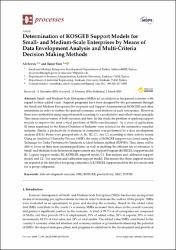| dc.contributor.author | Sevinc, Ali | |
| dc.contributor.author | Eren, Tamer | |
| dc.date.accessioned | 2020-06-25T18:34:13Z | |
| dc.date.available | 2020-06-25T18:34:13Z | |
| dc.date.issued | 2019 | |
| dc.identifier.citation | Sevinç A, Eren T. Determination of KOSGEB Support Models for Small- and Medium-Scale Enterprises by Means of Data Envelopment Analysis and Multi-Criteria Decision Making Methods. Processes. 2019; 7(3):130. | en_US |
| dc.identifier.issn | 2227-9717 | |
| dc.identifier.uri | https://doi.org/10.3390/pr7030130 | |
| dc.identifier.uri | https://hdl.handle.net/20.500.12587/7830 | |
| dc.description | Eren, Tamer/0000-0001-5282-3138 | en_US |
| dc.description | WOS: 000464445100001 | en_US |
| dc.description.abstract | Small- and Medium-Scale Enterprises (SMEs) act as catalysts in the general economy with regard to their added value. Support programs have been designed by the government through the Small and Medium Enterprises Development and Support Administration KOSGEB) and other institutions in order to further the general economic contributions of such enterprises. However, there is no method for using support models according to a productivity and effectiveness principle. This causes serious wastes of both resources and time. In this study, the problem of applying support models to improve the most critical problems of SMEs was discussed. As a place of application, 82 firms registered to the Konya Chamber of Industry were selected for the automotive supplier industry. Firstly, a productivity evaluation of companies was performed by a data envelopment analysis (DEA). Firms were grouped into A, B1, B2, C1, and C2 according to their activity scores. Using an Analytical Hierarchy Process (AHP), the order of KOSGEB support was found using the Technique for Order Preference by Similarity to Ideal Solution method (TOPSIS). Thus, firms will be able to focus on their most pressing problems, as well as enabling the efficient use of resources A: Small- and Medium-Scale Enterprises Improvement and Support Program (KOBIGEL) support model, B1: Logistic support model, B2: KOBIGEL support model, C1: Test analysis and calibration support model, and C2: Test analysis and calibration support model. This means that these support models are required in the first place for group companies.A KOBIGEL support model is the provincial rank for A group companies. | en_US |
| dc.description.sponsorship | Scientific Research Program (BAP) of Kirikkale UniversityKirikkale University | en_US |
| dc.description.sponsorship | This article is supported by Ankara-KOSGEB. This article is supported by Scientific Research Program (BAP) of Kirikkale University as project of 2015/138. | en_US |
| dc.language.iso | eng | en_US |
| dc.publisher | Mdpi | en_US |
| dc.relation.isversionof | 10.3390/pr7030130 | en_US |
| dc.rights | info:eu-repo/semantics/openAccess | en_US |
| dc.subject | data envelopment analysis | en_US |
| dc.subject | SME | en_US |
| dc.subject | KOSGEB | en_US |
| dc.subject | productivity | en_US |
| dc.subject | AHP | en_US |
| dc.subject | TOPSIS | en_US |
| dc.title | Determination of KOSGEB Support Models for Small- and Medium-Scale Enterprises by Means of Data Envelopment Analysis and Multi-Criteria Decision Making Methods | en_US |
| dc.type | article | en_US |
| dc.contributor.department | Kırıkkale Üniversitesi | en_US |
| dc.identifier.volume | 7 | en_US |
| dc.identifier.issue | 3 | en_US |
| dc.relation.journal | Processes | en_US |
| dc.relation.publicationcategory | Makale - Uluslararası Hakemli Dergi - Kurum Öğretim Elemanı | en_US |
















